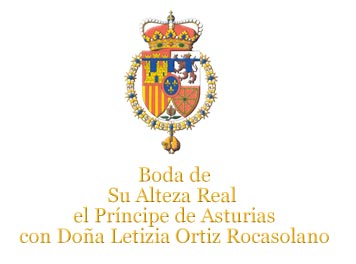
THE REAL WEDDING

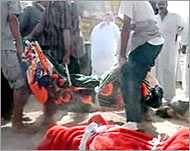
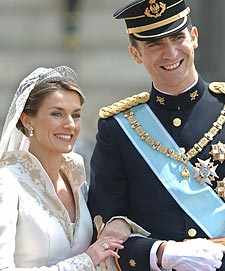
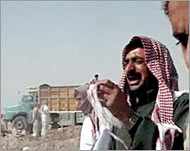

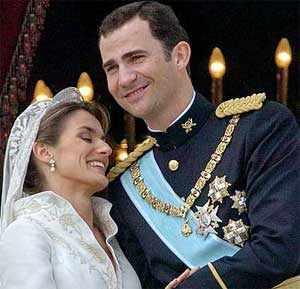
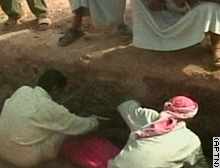
NEWSPAPERS & CORRESPONDENTS:
'US soldiers started to
shoot us, one by one'

Survivors describe wedding
massacre as generals refuse to apologise
Rory McCarthy in Ramadi
Friday May 21, 2004
The Guardian
The wedding feast was finished and the women had just led the young bride and
groom away to their marriage tent for the night when Haleema Shihab heard the
first sounds of the fighter jets screeching through the sky above.
It was 10.30pm in the remote village of Mukaradeeb by the Syrian border and the guests hurried back to their homes as the party ended. As sister-in-law of the groom, Mrs Shihab, 30, was to sleep with her husband and children in the house of the wedding party, the Rakat family villa. She was one of the few in the house who survived the night.
"The bombing started at 3am," she said yesterday from her bed in the emergency ward at Ramadi general hospital, 60 miles west of Baghdad. "We went out of the house and the U.S. soldiers started to shoot us. They were shooting low on the ground and targeting us one by one," she said. She ran with her youngest child in her arms and her two young boys, Ali and Hamza, close behind. As she crossed the fields a shell exploded close to her, fracturing her legs and knocking her to the ground.
She lay there and a second round hit her on the right arm. By then her two boys lay dead. "I left them because they were dead," she said. One, she saw, had been decapitated by a shell.
"I fell into the mud and an U.S. soldier came and kicked me. I pretended to be dead so he wouldn't kill me. My youngest child was alive next to me."
Mrs Shibab's description, backed by other witnesses, of an attack on a sleeping village is at odds with the U.S. claim that they came under fire while targeting a suspected foreign fighter safe house.
She described how in the hours before dawn she watched as U.S. troops destroyed the Rakat villa and the house next door, reducing the buildings to rubble.
Another relative carried Mrs Shihab and her surviving child to hospital. There she was told her husband Mohammed, the eldest of the Rakat sons, had also died.
As Mrs Shihab spoke she gestured with hands still daubed red-brown with the henna the women had used to decorate themselves for the wedding. Alongside her in the ward yesterday were three badly injured girls from the Rakat family: Khalood Mohammed, aged just a year and struggling for breath, Moaza Rakat, 12, and Iqbal Rakat, 15, whose right foot doctors had already amputated.
By the time the sun rose on Wednesday over the Rakat family house, the raid had claimed 42 lives, according to Hamdi Noor al-Alusi, manager of the al-Qaim general hospital, the nearest to the village.
Among the dead were 27 members of the extended Rakat family, their wedding guests and even the band of musicians hired to play at the ceremony, among them Hussein al-Ali from Ramadi, one of the most popular singers in western Iraq.
Dr Alusi said 11 of the dead were women and 14 were children. "I want to know why the U.S. targeted this small village," he said by telephone. "These people are my patients. I know each one of them. What has caused this disaster?"
Despite the compelling testimony of Mrs Shihab, Dr Alusi and other wedding guests, the US military, faced with appar ent evidence of yet another scandal in Iraq, offered an inexplicably different account of the operation.
The military admitted there had been a raid on the village at 3am on Wednesday but said it had targeted a "suspected foreign fighter safe house".
"During the operation, coalition forces came under hostile fire and close air support was provided," it said in a statement. Soldiers at the scene then recovered weapons, Iraqi dinar and Syrian pounds (worth approximately £800), foreign passports and a "Satcom radio", presumably a satellite telephone.
"We took ground fire and we returned fire," said Brigadier General Mark Kimmitt, deputy director of operations for the US military in Iraq. "We estimate that around 40 were killed. But we operated within our rules of engagement."
Major General James Mattis, commander of the 1st Marine Division, was scathing of those who suggested a wedding party had been hit. "How many people go to the middle of the desert ... to hold a wedding 80 miles (130km) from the nearest civilisation? These were more than two dozen military-age males. Let's not be naive."
When reporters asked him about footage on Arabic television of a child's body being lowered into a grave, he replied: "I have not seen the pictures but bad things happen in wars. I don't have to apologise for the conduct of my men."
The celebration at Mukaradeeb was to be one of the biggest events of the year for a small village of just 25 houses. Haji Rakat, the father, had finally arranged a long-negotiated tribal union that would bring together two halves of one large extended family, the Rakats and the Sabahs.
Haji Rakat's second son, Ashad, would marry Rutba, a cousin from the Sabahs. In a second ceremony one of Ashad's female cousins, Sharifa, would marry a young Sabah boy, Munawar.
A large canvas awning had been set up in the garden of the Rakat villa to host the party. A band of musicians was called in, led by Hamid Abdullah, who runs the Music of Arts recording studio in Ramadi, the nearest major town.
He brought his friend Hussein al-Ali, a popular Iraqi singer who performs on Ramadi's own television channel. A handful of other musicians including the singer's brother Mohaned, played the drums and the keyboards.
The ceremonies began on Tuesday morning and stretched through until the late evening. "We were happy because of the wedding. People were dancing and making speeches," said Ma'athi Nawaf, 55, one of the neighbours.
Late in the evening the guests heard the sound of jets overhead. Then in the distance they saw the headlights of what appeared to be a military convoy heading their way across the desert.
The party ended at around 10.30pm and the neighbours left for their homes. At 3am the bombing began. "The first thing they bombed was the tent for the ceremony," said Mr Nawaf. "We saw the family running out of the house. The bombs were falling, destroying the whole area."
Armoured military vehicles then drove into the village, firing machine guns and supported by attack helicopters. "They started to shoot at the house and the people outside the house," he said.
Before dawn two large Chinook helicopters descended and offloaded dozens of troops. They appeared to set explosives in the Rakat house and the building next door and minutes later, just after the Chinooks left again, they exploded into rubble.
"I saw something that nobody ever saw in this world," said Mr Nawaf. "There were children's bodies cut into pieces, women cut into pieces, men cut into pieces."
Among the dead was his daughter Fatima Ma'athi, 25, and her two young boys, Raad, four, and Raed, six. "I found Raad dead in her arms. The other boy was lying beside her. I found only his head," he said. His sister Simoya, the wife of Haji Rakat, was also killed with her two daughters. "The U.S. call these people foreign fighters. It is a lie. I just want one piece of evidence of what they are saying."
Remarkably among the survivors were the two married couples, who had been staying in tents away from the main house, and Haji Rakat himself, an elderly man who had gone to bed early in a nearby house.
From the mosques of Ramadi volunteers had been called to dig at the graveyard of the tribe, on the southern outskirts of the city.
There lay 27 graves: mounds of dirt each marked with a single square of crudely cut marble, a name scribbled in black paint. Some gave more than one name, and one, belonging to a woman Hamda Suleman, the briefest of explanations:
"The U.S. bombing."*
* "The american bombing" in the original

=========================================================================
Synoptic view from a C.I.A. site:
Thank you
|
Link |
Time |
Text |
|
May 19, 2004 18:16 Zulu |
Associated Press BAGHDAD, Iraq (AP) - A U.S. helicopter fired on a wedding party before dawn Wednesday in western Iraq, killing more than 40 people, Iraqi officials said. The U.S. military said it could not confirm the report and was investigating. Lt. Col Ziyad al-Jbouri, deputy police chief of Ramadi, said between 42 and 45 people were killed in the attack, which took place about 2:45 a.m. in a remote desert area near the border with Syria and Jordan. He said the dead included 15 children and 10 women. Dr. Salah al-Ani, who works at a hospital in Ramadi, put the death toll at 45. Associated Press Television News obtained videotape showing a truck containing bodies of people who were allegedly killed in the incident. Most of the bodies were wrapped in blankets and other cloths, but the footage showed at least eight uncovered, bloody bodies, several of them children. One of the children was headless. |
|
|
May 19, 2004 20:07 Zulu |
A US helicopter fired on a wedding party in
western Iraq, killing more than 40 people, Iraqi officials said.
The US military said it could not confirm the report and was investigating. Lieutenant Colonel Ziyad al-Jbouri, deputy police chief of Ramadi, said between 42 and 45 people were killed in the attack, which took place about 2:45am (0845 AEST) in a remote desert area near the border with Syria and Jordan. He said the dead included 15 children and 10 women. Salah al-Ani, a doctor working at a hospital in Ramadi, put the death toll at 45. Associated Press Television News obtained videotape showing a truck containing bodies of people who were allegedly killed in the incident. Most of the bodies were wrapped in blankets and other cloths, but the footage showed at least eight uncovered, bloody bodies, several of them children. One of the children was headless. Iraqis interviewed on the videotape said partygoers were firing in the air in traditional wedding celebration. American troops have sometimes mistaken celebratory gunfire for hostile fire. |
|
|
May 19, 2004 20:46 Zulu |
Associated Press
BAGHDAD, Iraq (AP) - A U.S. aircraft fired on a house in the desert near the Syrian border Wednesday, and Iraqi officials said more than 40 people were killed, including children. The U.S. military said the target was a suspected safehouse for foreign fighters from Syria, but Iraqis said a helicopter had attacked a wedding party. ... The attack happened about 2:45 a.m. in a desert region near the border with Syria and Jordan, according to Lt. Col. Ziyad al-Jbouri, deputy police chief of Ramadi, the provincial capital about 250 miles to the east. He said 42 to 45 people died, including 15 children and 10 women. Dr. Salah al-Ani, who works at a hospital in Ramadi, put the death toll at 45. The area, a desolate region populated only by shepherds, is popular with smugglers, including weapons smugglers, and the U.S. military suspects militants use it as a route to slip in from Syria to fight the Americans. It is under constant surveillance by American forces. In a statement, the U.S. Central Command said coalition forces conducted a military operation at 3 a.m. against a ``suspected foreign fighter safe house'' in the open desert, about 50 miles southwest of Husaybah and 15 miles from the Syrian border. The coalition troops came under hostile fire and ``close air support was provided,'' the statement said. The troops recovered weapons, Iraqi and Syrian currency, some passports and some satellite communications gear, it said. |
|
|
May 20, 2004 01:00 Zulu |
BAGHDAD - The US army said on Thursday it killed around 40 people in an attack on suspected foreign fighters in Iraq near the Syrian border, but disputed reports that the victims were members of a wedding party. ... "At 0300 (11pm NZT Wednesday) we conducted an operation about 85km southwest of al-Qaim...against suspected foreign fighters in a safe house," Kimmitt said. "We took ground fire and we returned fire." Kimmitt said there were no indications that the victims of the attack were part of a wedding party. He said a large amount of money, Syrian passports and satellite communications equipment had been found at the site after the attack. But Dubai-based Al Arabiya television, quoting eyewitnesses, said the raid on the village of Makr al-Deeb before dawn had targeted people celebrating a wedding and had killed at least 41 civilians. "We received about 40 martyrs today, mainly women and children below the age of 12," Hamdy al-Lousy, the director of Qaim hospital, told Al Arabiya. "We also have 11 people wounded, most of them in critical condition." Arabiya showed pictures of several shrouded bodies lined up on a dirt road. Men were shown digging graves and lowering bodies, one of a child, into the pits while relatives wept. "The US planes dropped more than 100 bombs on us," an unidentified man who said he was from the village said on Al Arabiya. "They hit two homes where the wedding was being held and then they levelled the whole village. No bullets were fired by us, nothing was happening," he added. |
|
|
May 20, 2004 09:36 Zulu |
Associated Press BAGHDAD, Iraq (AP) A U.S. air strike near the Syrian border killed more than 40 people, Iraqi officials said, and while the U.S. military said the target was a suspected safehouse for foreign fighters from Syria, Iraqis said a helicopter had attacked a wedding party. The attack Wednesday happened about 2:45 a.m. in a desert region near the border with Syria and Jordan, according to Lt. Col. Ziyad al-Jbouri, deputy police chief of Ramadi, the provincial capital about 250 miles to the east. He said 42 to 45 people died, including 15 children and 10 women. Dr. Salah al-Ani, who works at a hospital in Ramadi, put the death toll at 45. The strike came before American soldiers clashed Wednesday with Shiite militiamen in two cities south of the capital, killing at least eight of them, U.S. officials said. Mortars and rockets fell on widely scattered areas of the Iraqi capital. |
=====================================================
Wedding party massacre A senior Iraqi police officer told the Associated Press that a helicopter
fired at the party early yesterday morning in a remote village close to the
Syrian border, killing between 42 and 45 people.
Television footage showed a truck carrying the bodies of the dead arriving in
Ramadi, the nearest big town. Many of the dead were clearly children.
In a written statement the Pentagon said last night: "Our report is that
this was not a wedding party, that these were anti-coalition forces that fired
first, and that US troops returned fire, destroying several vehicles, and
killing a number of them.
"During the operation, coalition forces came under hostile fire and
close air support was provided."
He said coalition forces on the ground recovered numerous weapons, 2m Iraqi
dinars and Syrian pounds, foreign passports and a satcom radio.
Brigadier General Mark Kimmitt, deputy director of operations for the US
military in Iraq, told Reuters the attack targeted "a suspected foreign
fighter safe house".
The killings, if proven, are certain to damage even further the US military's
battered reputation in Iraq. Already the US is reeling from its much-criticised
operations in Falluja last month which claimed hundreds of Iraqi lives and now
the scandal of prisoner abuse at Abu Ghraib prison.
The attack came on the same day as the US military convicted in a court
martial the first soldier involved in the prison abuse, an attempt to rebuild
the US military's image among the Iraqi people.
Witnesses said yesterday that guests had been firing guns into the air in a
traditional sign of celebration before the American helicopter attack in the
village of Mukaradeeb, near the town of al-Qaim in western Iraq.
Lieutenant Colonel Ziyad al-Jbouri, the deputy police chief for Ramadi, 80
miles west of Baghdad, told AP that the dead included 15 children and 10 women.
He said the attack happened at 2:45am yesterday in a desert area near the remote
border with Syria.
"This was a wedding and the planes came and attacked the people at a
house. Is this the democracy and freedom that Bush has brought us? There was no
reason," said Dahham Harraj, one man filmed in an AP video.
Television footage broadcast last night on the al-Arabiya television channel
showed a truck laden with bodies.
Men carried the bodies wrapped in blankets from the back of the truck into
deep graves in the desert on the outskirts of Ramadi. One body, carried in a
white blanket, was that of a young girl aged five or six. Other bodies, laid on
the ground in a line, had clearly suffered horrific injuries.
One man, wearing a white and black keffiyeh, told the television channel he
saw the Americans bomb the village. "We were in Mukaradeeb. At 3am they
rained the air with bombs," he said. "One after another the bombs were
falling. Three houses with the guests inside were hit. They fired as if there
were an armoured brigade inside, not a wedding party."
In a video filmed by AP another anonymous man said the victims had been
guests at the wedding. "The US military planes came ... and started killing
everyone in the house," he said.
Salah al-Ani, a doctor at the hospital in Ramadi, told AP the death toll was
45. He said the wedding guests had been firing in the air. American troops had
come to investigate and then left. At about 3 am, they returned in helicopters
and destroyed two houses.
The attack had the hallmarks of a similar incident in Afghanistan two years
ago in which a US jet fired at a wedding party in Uruzgan province, in the
south, killing 48 Afghan civilians and wounding more than 100.
The wedding had been targeted because guests were firing Kalashnikovs in the
air as a traditional sign of celebration. After an investigation, the pilots
were exonerated and the US military said they had come under fire.
The village of Mukaradeeb - "the wolves' den" - is a small remote
village of barely a dozen houses in the desert by Iraq's western border.
A convoy near the village came under attack by the US military last June,
reportedly because the army believed Saddam Hussein was moving through the area,
heading towards Syria.
More recently US troops have conducted aggressive operations around the town
of al-Qaim, cordoning it off for several days at one point as they arrested
dozens of young men.
======================================================
Iraqis claim more than 40
killed in US helicopter attack
Rory McCarthy in Baghdad
Thursday May 20, 2004
The Guardian
Iraqi officials last night said an American helicopter fired on a wedding party
in western Iraq killing more than 40 people, including many children, in another
damaging setback for the US occupation.
Monday, May 24, 2004 at 05:00 JST
RAMADI, Iraq —
A videotape released to TV networks Sunday shows a wedding party that survivors say was later attacked by U.S. planes early Wednesday, killing up to 45 people. The dead included the cameraman, Yasser Shawkat Abdullah, hired to record the festivities, which ended Tuesday night before the planes struck.
The U.S. military says it is investigating the attack, which took place in
the village of Mogr el-Deeb about five miles from the Syrian border, but that
all evidence so far indicates the target was a safehouse for foreign fighters.
"There was no evidence of a wedding: no decorations, no musical instruments
found, no large quantities of food or leftover servings one would expect from a
wedding celebration," Brig Gen Mark Kimmitt said Saturday. "There may
have been some kind of celebration. Bad people have celebrations, too."
But video shot a day after the attack shows fragments of musical instruments, pots and pans and brightly colored beddings used for celebrations, scattered around the bombed out tent.
The wedding videotape shows a dozen white pickup trucks speeding through the desert escorting the bridal car — decorated with colorful ribbons. The bride wears a Western-style white bridal dress and veil. The camera captures her stepping out of the car but does not show a close-up.
TV cameramen also traveled to Mogr el-Deeb, 400 kms iles west of Ramadi, the day after the attack to film what the survivors said was the wedding site. A devastated building and remnants of the tent, pots and pans could be seen, along with bits of what appeared to be the remnants of ordnance, one of which bore the marking "ATU-35," similar to those on U.S. bombs.
The singing and dancing seems to go on forever at the all-male tent set up in the garden of the host, Rikad Nayef, for the wedding of his son, Azhad, and the bride Rutbah Sabah. The men later move to the porch when darkness falls, apparently taking advantage of the cool night weather. Children, mainly boys, sit on their fathers' laps; men smoke an Arab water pipe, finger worry beads and chat with one another. It looks like a typical, gender-segregated tribal desert wedding.
As expected, women are out of sight — but according to survivors, they danced to the music of Hussein al-Ali, a popular Baghdad wedding singer hired for the festivities. Al-Ali was buried in Baghdad on Thursday.
Prominently displayed on the videotape was a stocky man with close-cropped hair playing an electric organ. Another tape, filmed a day later in Ramadi, showed the musician lying dead in a burial shroud — his face clearly visible and wearing the same tan shirt as he wore when he performed.
As the musicians played, young men milled about, most dressed in traditional white robes. Young men swayed in tribal dances to the monotonous tones of traditional Arabic music. Two children — a boy and a girl — held hands, dancing and smiling. Women are rarely filmed at such occasions, and they appear only in distant glimpses.
Kimmitt said U.S. troops who swept through the area found rifles, machine guns, foreign passports, bedding, syringes and other items that suggested the site was used by foreigners infiltrating from Syria.
The videotape showed no weapons, although they are common among rural Iraqis.
Kimmitt has denied finding evidence that any children died in the raid although a "handful of women" — perhaps four to six — were "caught up in the engagement."
"They may have died from some of the fire that came from the aircraft," he told reporters Friday.
Four days after the attack, the memories of the survivors remain painful — as are their injuries.
Haleema Shihab, 32, one of the three wives of Rikad Nayef, said that as the first bombs fell, she grabbed her seven-month old son, Yousef, and clutching the hands of her five-year-old son, Hamza, started running. Her 15-year-old son, Ali, sprinted alongside her. They managed to run for several yards when she fell, her leg fractured.
"Hamza was yelling, 'mommy,'" Shihab, recalled. "Ali said he was hurt and that he was bleeding. That's the last time I heard him." Then another shell fell and injured Shihab's left arm.
"Hamza fell from my hand and was gone. Only Yousef stayed in my arms. Ali had been hit and was killed. I couldn't go back," she said from her hospital bed in Ramadi. Her arm was in a cast.
She and her stepdaughter, Iqbal — who had caught up with her — hid in a bomb crater. "We were bleeding from 3 a.m. until sunrise," Shihab said.
Soon US soldiers came. One of them kicked her to see if she was alive, she said.
"I pretended I was dead so he wouldn't kill me," said Shihab. She said the soldier was laughing. When Yousef cried, the soldier said: "'No, stop," said Shihab. (Wire reports)
=============================================
|
Wedding Party Massacre in Iraq |
| by Rory McCarthy; UK Guardian; May 21, 2004 |
Mahdi Nawaf shows photographs of his family members - father, wife and six children - killed in a US attack on what is claimed was a sleeping village Photograph: Anna Niedringhaus/AP
The wedding feast was finished and the women had just led the young bride and groom away to their marriage tent for the night when Haleema Shihab heard the first sounds of the fighter jets screeching through the sky above.
It was 10.30pm in the remote village of Mukaradeeb by the Syrian border and the guests hurried back to their homes as the party ended. As sister-in-law of the groom, Mrs Shihab, 30, was to sleep with her husband and children in the house of the wedding party, the Rakat family villa. She was one of the few in the house who survived the night.
"The bombing started at 3am," she said yesterday from her bed in the emergency ward at Ramadi general hospital, 60 miles west of Baghdad. "We went out of the house and the US soldiers started to shoot us. They were shooting low on the ground and targeting us one by one," she said. She ran with her youngest child in her arms and her two young boys, Ali and Hamza, close behind. As she crossed the fields a shell exploded close to her, fracturing her legs and knocking her to the ground.
She lay there and a second round hit her on the right arm. By then her two boys lay dead. "I left them because they were dead," she said. One, she saw, had been decapitated by a shell.
"I fell into the mud and an US soldier came and kicked me. I pretended to be dead so he wouldn't kill me. My youngest child was alive next to me."
Mrs Shibab's description, backed by other witnesses, of an attack on a sleeping village is at odds with the American claim that they came under fire while targeting a suspected foreign fighter safe house.
She described how in the hours before dawn she watched as US troops destroyed the Rakat villa and the house next door, reducing the buildings to rubble.
Another relative carried Mrs Shihab and her surviving child to hospital. There she was told her husband Mohammed, the eldest of the Rakat sons, had also died.
As Mrs Shihab spoke she gestured with hands still daubed red-brown with the henna the women had used to decorate themselves for the wedding. Alongside her in the ward yesterday were three badly injured girls from the Rakat family: Khalood Mohammed, aged just a year and struggling for breath, Moaza Rakat, 12, and Iqbal Rakat, 15, whose right foot doctors had already amputated.
By the time the sun rose on Wednesday over the Rakat family house, the raid had claimed 42 lives, according to Hamdi Noor al-Alusi, manager of the al-Qaim general hospital, the nearest to the village.
Among the dead were 27 members of the extended Rakat family, their wedding guests and even the band of musicians hired to play at the ceremony, among them Hussein al-Ali from Ramadi, one of the most popular singers in western Iraq.
Dr Alusi said 11 of the dead were women and 14 were children. "I want to know why the Americans targeted this small village," he said by telephone. "These people are my patients. I know each one of them. What has caused this disaster?"
Despite the compelling testimony of Mrs Shihab, Dr Alusi and other wedding guests, the US military, faced with appar ent evidence of yet another scandal in Iraq, offered an inexplicably different account of the operation.
The military admitted there had been a raid on the village at 3am on Wednesday but said it had targeted a "suspected foreign fighter safe house".
"During the operation, coalition forces came under hostile fire and close air support was provided," it said in a statement. Soldiers at the scene then recovered weapons, Iraqi dinar and Syrian pounds (worth approximately £800), foreign passports and a "Satcom radio", presumably a satellite telephone.
"We took ground fire and we returned fire," said Brigadier General Mark Kimmitt, deputy director of operations for the US military in Iraq. "We estimate that around 40 were killed. But we operated within our rules of engagement."
Major General James Mattis, commander of the 1st Marine Division, was scathing of those who suggested a wedding party had been hit. "How many people go to the middle of the desert . . . to hold a wedding 80 miles (130km) from the nearest civilisation? These were more than two dozen military-age males. Let's not be naive."
When reporters asked him about footage on Arabic television of a child's body being lowered into a grave, he replied: "I have not seen the pictures but bad things happen in wars. I don't have to apologise for the conduct of my men."
The celebration at Mukaradeeb was to be one of the biggest events of the year for a small village of just 25 houses. Haji Rakat, the father, had finally arranged a long-negotiated tribal union that would bring together two halves of one large extended family, the Rakats and the Sabahs.
Haji Rakat's second son, Ashad, would marry Rutba, a cousin from the Sabahs. In a second ceremony one of Ashad's female cousins, Sharifa, would marry a young Sabah boy, Munawar.
A large canvas awning had been set up in the garden of the Rakat villa to host the party. A band of musicians was called in, led by Hamid Abdullah, who runs the Music of Arts recording studio in Ramadi, the nearest major town.
He brought his friend Hussein al-Ali, a popular Iraqi singer who performs on Ramadi's own television channel. A handful of other musicians including the singer's brother Mohaned, played the drums and the keyboards.
The ceremonies began on Tuesday morning and stretched through until the late evening. "We were happy because of the wedding. People were dancing and making speeches," said Ma'athi Nawaf, 55, one of the neighbours.
Late in the evening the guests heard the sound of jets overhead. Then in the distance they saw the headlights of what appeared to be a military convoy heading their way across the desert.
The party ended at around 10.30pm and the neighbours left for their homes. At 3am the bombing began. "The first thing they bombed was the tent for the ceremony," said Mr Nawaf. "We saw the family running out of the house. The bombs were falling, destroying the whole area."
Armoured military vehicles then drove into the village, firing machine guns and supported by attack helicopters. "They started to shoot at the house and the people outside the house," he said.
Before dawn two large Chinook helicopters descended and offloaded dozens of troops. They appeared to set explosives in the Rakat house and the building next door and minutes later, just after the Chinooks left again, they exploded into rubble.
"I saw something that no body ever saw in this world," said Mr Nawaf. "There were children's bodies cut into pieces, women cut into pieces, men cut into pieces."
Among the dead was his daughter Fatima Ma'athi, 25, and her two young boys, Raad, four, and Raed, six. "I found Raad dead in her arms. The other boy was lying beside her. I found only his head," he said. His sister Simoya, the wife of Haji Rakat, was also killed with her two daughters. "The US call these people foreign fighters. It is a lie. I just want one piece of evidence of what they are saying."
Remarkably among the sur vivors were the two married couples, who had been staying in tents away from the main house, and Haji Rakat himself, an elderly man who had gone to bed early in a nearby house.
From the mosques of Ramadi volunteers had been called to dig at the graveyard of the tribe, on the southern outskirts of the city.
There lay 27 graves: mounds of dirt each marked with a single square of crudely cut marble, a name scribbled in black paint. Some gave more than one name, and one, belonging to a woman Hamda Suleman, the briefest of explanations: "The American bombing."